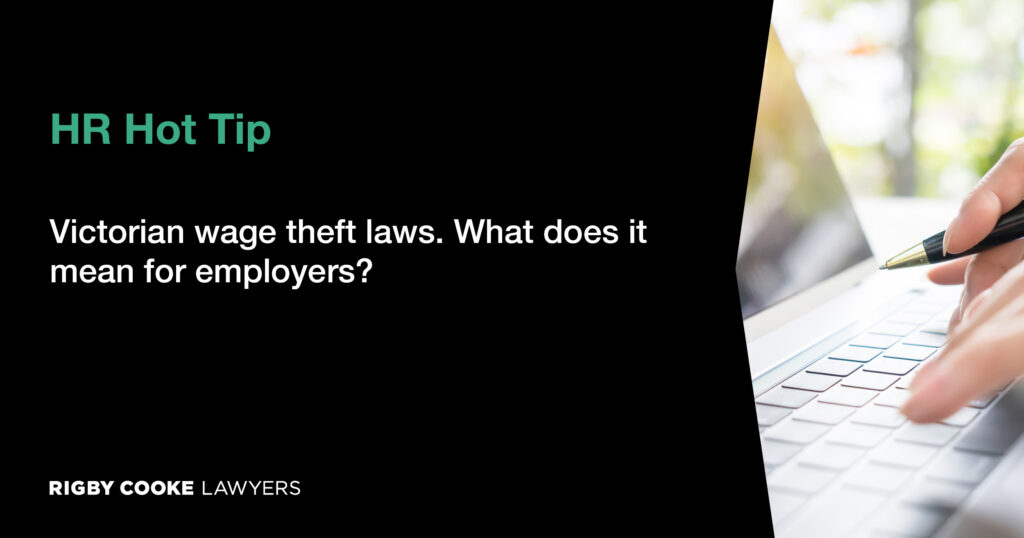Welcome to our series of HR interviews with Workplace Relations Associate Stephanie Shahine, who answers some of the most commonly asked questions by HR managers regarding employees’ legal entitlements and employers’ health and safety requirements.
From 1 July 2021, it became a crime for an employer to knowingly and deliberately underpay or withhold entitlements from employees in the State of Victoria as the Wage Theft Act 2020 (the Act) is now in effect.
As an employer, you may be considering, what does it mean for me, and who within the business can be held responsible?
Employers are to ensure that employees are receiving their full entitlements or risk a fine of up to:
- $218,000 or up to 10 years imprisonment for individuals
- $1,090,440 for companies1.
These newly passed laws are directed towards employers who deliberately and intentionally withhold or underpay entitlements to their employees. The element of dishonesty must be present as the employer must not withhold or authorise another individual to withhold the whole or part of an employee’s entitlement. Dishonest conduct could also include an employer being reckless about whether employees are being paid correctly. This conduct is not deemed to be dishonest if the employee provides their consent and the withholding of the entitlements is not below their statutory entitlements as required by law.
Other such offences under the Act include falsifying records and failing to keep accurate and up to date employee records.
Investigations into alleged breaches can take place. These investigations can only take place for offences committed on or after 1 July 2021. Unpaid entitlements which have accrued prior to 1 July 2021 can be included in the investigation if the employer continues to engage in dishonest conduct on or after 1 July 2021.
What if my employees signed a contract to receive fewer entitlements and pay?
As an employer, you must always pay your employees in line with the minimum pay and conditions outlined in the relevant workplace agreement, award, contract of employment or legislation as outlined by the Fair Work Ombudsman2. A contract or agreement between the employer and employee cannot overrule the minimum pay and conditions set out in awards, legislation, and registered workplace agreements.
Who can be charged under the new wage theft laws?
Under the Act employers and ‘officers’ of the employer can be held liable.
The meaning of ‘officer’ within a business depends on the entity type of the employer. However, it generally applies to positions within the company that have significant influence and decision-making responsibilities, including:
- Directors
- Office holders (includes committee members, the secretary and those who make decisions that affect the operations of an incorporated association3)
- Partners
- Those who make significant decisions for the business on behalf of the employer4.
Now is the time to review your employee agreements to ensure they meet the requirements of their relevant award, legislation or registered workplace agreement to avoid these serious penalties for yourself and your business. An audit of compliance can not only find any problems but also reduce the risk of being prosecuted if errors recklessly go uncorrected.
Employers need to familiarise themselves with and understand their legal obligations to avoid any possible claims by employees (both existing and former), as well as prosecution by the Fair Work Ombudsman or Safe Work Australia.
A HR Legal Audit conducted by Rigby Cooke’s Workplace Relations team can provide the HR function and, in turn, provide employers with comfort in knowing that they are legally compliant, or at least provide advance warning of any potential compliancy issues before they become problematic.
1. https://www.vic.gov.au/wage-theft-employer-information
2. https://www.fairwork.gov.au/awards-and-agreements
3. https://www.consumer.vic.gov.au/clubs-and-fundraising/incorporated-associations/running-an-incorporated-association/secretary-committee-and-office-holders/office-holders
4. https://content.legislation.vic.gov.au/sites/default/files/2020-06/20-021aa%20authorised.pdf
| Disclaimer: This publication contains comments of a general nature only and is provided as an information service. It is not intended to be relied upon as, nor is it a substitute for specific professional advice. No responsibility can be accepted by Rigby Cooke Lawyers or the authors for loss occasioned to any person doing anything as a result of any material in this publication.
Liability limited by a scheme approved under Professional Standards Legislation. ©2021 Rigby Cooke Lawyers |

